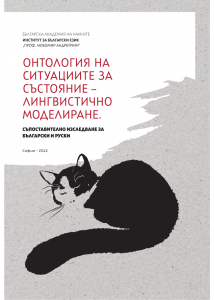Аргументная структура ментальных предикатов в русском языке: взаимодействие семантических, синтаксических и коммуникативных факторов
Argument structure of mental predicates in Russian: interaction of semantic, syntactic and discourse factors
Author(s): Alexander Letuchiy
Subject(s): Language studies, Language and Literature Studies, Theoretical Linguistics, Applied Linguistics, Morphology, Syntax, Lexis, Semantics, Cognitive linguistics, Descriptive linguistics, Eastern Slavic Languages
Published by: Институт за български език „Проф. Любомир Андрейчин“, Българска академия на науките
Keywords: mental predicates; factivity; coordination; pronominalization; experiencer; unmarked complement clauses
Summary/Abstract: The article aims at the description and analysis of the argument structure of Russian mental predicates. The study focuses primarily on the syntactic properties of arguments and the interaction between their syntactic, semantic, and discourse properties. It turns out that the opposition of factive knowledge predicates vs. non-factive opinion predicates map onto their discourse characteristics (arguments of opinion verbs are normally less topical than arguments of knowledge verbs) and their syntactic features (arguments of knowledge verbs become antecedents of pronouns and conjuncts of coordinate constructions more easily). These observations lead us to conclude that factive predicates are closer to the bivalent verb prototype than non-factive ones.
- Page Range: 210-246
- Page Count: 37
- Publication Year: 2022
- Language: Russian
- Content File-PDF

